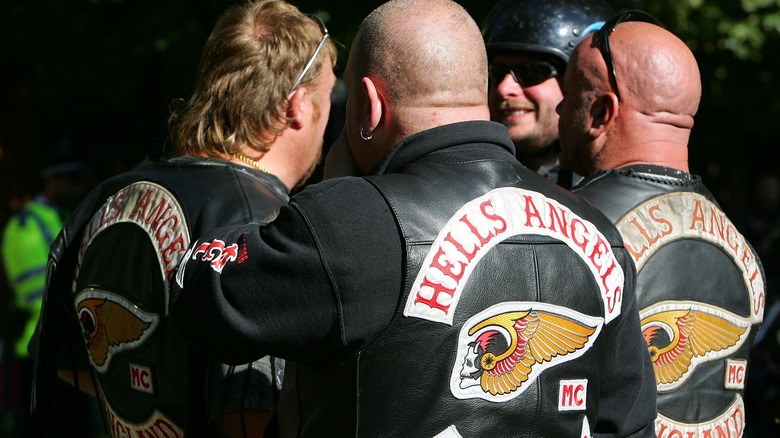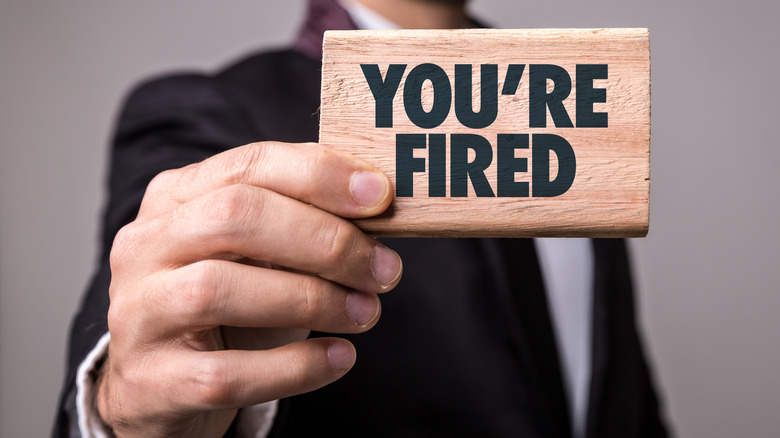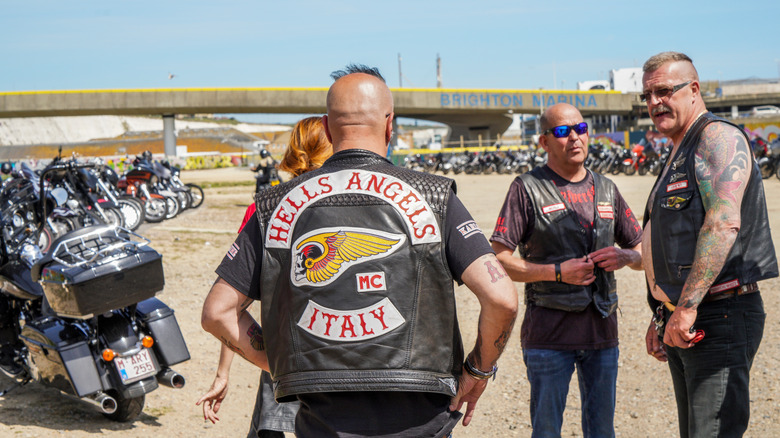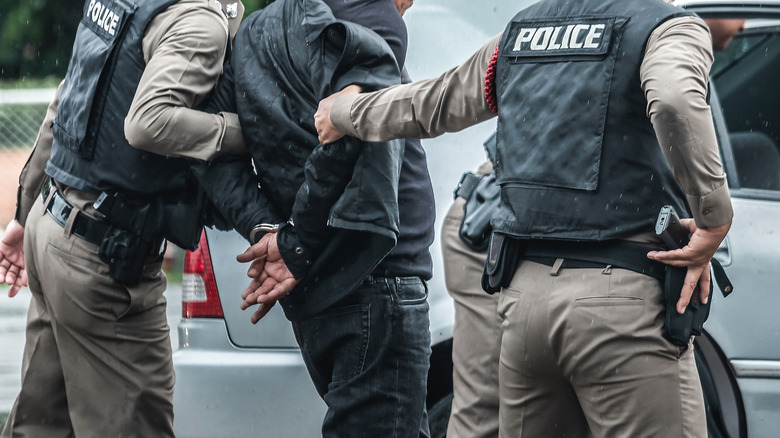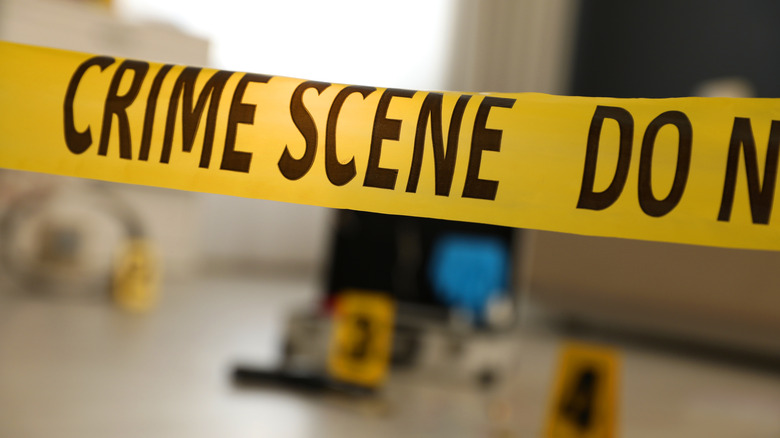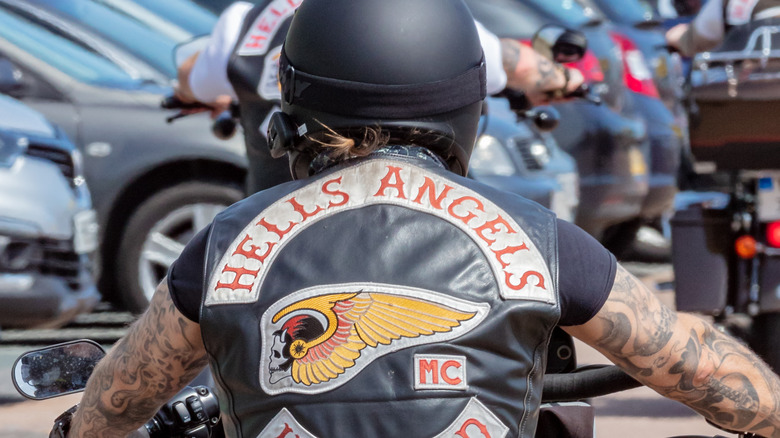What Former Hells Angels Have Revealed About Their Time In The Club
The Hells Angels Motorcycle Club was formed by a group of World War II veterans way back in 1948, and in the seven-plus decades since, they have evolved significantly from their origins as a counterculture organization with "as few rules as possible" (as described by Oakland chapter president Ralph "Sonny" Barger) to an actual gang that can be considered an organized crime outfit. As far back as the 1960s, the Angels were making headlines for their criminal activities, including an alleged gang rape in 1964 and the murder of teenager Meredith Hunter at the Altamont Music Festival in 1969. But is life as a member of the Angels consistent with how it's often depicted in popular media and by news outlets and law enforcement agencies?
Despite their reputation as outlaws who engage in illegal shenanigans on a consistent basis, the Hells Angels are known to be quite secretive. A lot of what you may have seen in television shows like "Sons of Anarchy" and its spinoff, "Mayans M.C.," should be taken with a grain of salt because of this commitment to secrecy. However, there are numerous former Hells Angels who have opened up about their time in the organization, including two former chapter officers whose stories have been shared with various publications in recent years.
You could lose your 'real job' if you're a Hells Angel
Many biker club members are regular guys when they aren't fooling around with their choppers. It takes money to buy a big motorcycle and maintain it, so why not work a 9-to-5 job when you aren't riding from town to town with your biker buddies? That was how life was for former Ventura, California, Hells Angels president George Christie in the 1970s. Aside from being a family man with a wife and children, he was making a more than decent living with the Department of Defense and was also a Marine reservist. It just so happened that he really, really loved the biker gang lifestyle.
Not long after Christie became an official Hells Angels member in 1976, the Pentagon got wind of his secret life and gave him an ultimatum. "Once they found out I was a member of the Hells Angels they basically gave me a choice, them or us," he recalled to KQED. "I got up and said, 'Well, I'll see you guys.' It was a big step for me, and I basically immersed myself in the outlaw bike world."
Asked why he chose the Hells Angels over the financial stability of a Department of Defense job, Christie explained that it was similar to how a wannabe Old West gunfighter would suddenly change his mind and start hanging with the outlaws after being exposed to the James Gang or Billy the Kid.
Being a Hells Angel isn't all fun and games (and crime)
If you, for instance, are a member of a band, it can't be all about living the rock 'n' roll lifestyle. If you want to at least make an impact in your local scene, you need to promote your band aggressively — whereas back in the day it was by sticking gig posters on the walls of buildings or on car windows, now it's through social media posts and pitches to streaming playlist curators. How does this relate to the Hells Angels? As another former high-ranking member recalled, being part of the organization and keeping one's badge took a lot of work behind the scenes, to the point where after a few years, it was no longer about "riding your motorcycle and partying."
"You have to pay club dues to buy into the clubhouse and help sell the supporters' gear, like T-shirts, which makes a lot of money," said former downtown Toronto Hells Angels sergeant-at-arms Dave "Shaky" Atwell in an interview with Maclean's. "We drove all around the province, even in pouring rain, for mandatory parties. It was very corporate." He also talked about how Hells Angels chapter meetings would actually involve someone taking down the minutes — just like one would in an office setting. That doesn't sound very exciting, does it? Then again, at least there isn't anything illegal about sitting through yet another boring meeting.
Here's why many Hells Angels turn to crime
While talking to Maclean's, Atwell also looked back on how he started out with motorcycle clubs. Before his original club, the Para-Dice Riders, was absorbed into the Hells Angels, the group was made up of average, everyday guys with a love for big bikes. Sure, there were some members who dabbled in drug dealing and other crimes, but there was nothing on an organized level — yet. But when Atwell, at that time a full-fledged Hells Angel, lost his security job after he was found to be part of an outlaw motorcycle gang, he had no choice but to do as the Romans were doing and start selling drugs.
"I'd make $1,700 per kilo of cocaine, delivering it a few blocks [away], stashed in a KFC bag," he said. "I'd rent a car or take public transit to make the dead drops. That was my life. I lost a lot of old friends. Everyone was surprised when I became a Hells Angel, but I saw the individual, not the patch. When I saw what the patch did to those individual people, it turned me off."
Likewise, the Ventura chapter's George Christie also ran afoul of the law multiple times after becoming a full-time Hells Angel. Per KQED, he had separate stints in prison for murder (though he was found not guilty after a year behind bars), dealing prescription drugs, and conspiracy to firebomb a couple of local tattoo parlors.
Some Hells Angels don't care about collateral damage during gang wars
It isn't only rival bikers whose lives are at risk when any given motorcycle gang has a score to settle — normal, law-abiding citizens can also find themselves in grave danger during such situations. Writing for Narratively, Christie went into detail about how even in his younger days, he was staunchly against the Hells Angels' use of bombs as a weapon in gang warfare. He was disturbed by their potential to maim or kill innocent civilians and how cases of collateral damage could lead to unwanted attention from the police. This, he said, was an unpopular opinion among his associates, whom he claimed accused him behind his back of being "weak," or possibly being an undercover cop or an informant.
As he later revealed in the long-form piece, there was a specific incident in the late 1970s that stood out as the one that made him question the outlaw lifestyle he was living. According to Christie, Hells Angels prospect Thomas Heath orchestrated a scheme where he would walk into a bike shop and ask one of the mechanics, who was affiliated with the rival Mongols, to change his flat tire. The tire had a bomb inside it that would detonate once the valve was unscrewed. After a "heated exchange," mechanic Henry Jimenez agreed to change the tire, and when he did, the bomb went off, killing Jimenez and 15-year-old Raymond Hernandez, whose older brother was a Mongols member.
It wasn't just the death of an innocent teenager that bothered Christie; he was also appalled by how Heath, as he claimed, showed no remorse for his actions and loudly bragged about the fatal explosion "for days."
Your most bitter enemies may turn out to be your own gangmates
The chicanery and betrayal that took place so often during the seven-season run of "Sons of Anarchy" may be more grounded on reality than you think. Members of the Hells Angels and other biker gangs frequently run afoul of the law, and it's not uncommon for them to temporarily maintain a much lower profile, or even go into hiding. However, Christie also admitted that during his time with the Ventura Hells Angels, it wasn't the cops he was most worried about, but rather his own gangmates.
"It got very, very vicious, and you didn't know who to trust or who not to trust," he told KQED. "Maybe that was the beginning of the end ... I think that the mere fact that I took the position that my former associates had become people I would have rebelled against is the main reason I left." Similarly, Dave Atwell revealed that Angels trying to get their gangmates kicked out "over petty things" happened on the regular while he was with his chapter in Toronto. He added (via Maclean's) that jealousy ran high between the less privileged members of his chapter and the richer ones making a lot of dough as part of the gang.
Following his departure from the Angels, Christie was incorrectly rumored to have become an informant, a rat who could squeal to the Feds about the gang's activities and get a lot of people in deep, deep trouble. He then received a phone call informing him that he was "excommunicated" from the Angels. "No one was allowed to talk to me and I wasn't allowed to talk to anybody," he explained.
